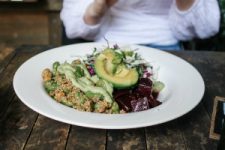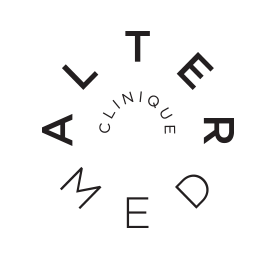Clinique altermed
Montreal nutrition
A vegan diet only includes plant-based foods such as cereals and grains, legumes, vegetables, fruits, nuts and seeds. It excludes all animal-derived foods including meats, fish, seafood, chicken, eggs, dairy products (including products with casein, whey, rennet or gelatine), animal fats (eg lard and suet) and generally also honey and yeast.
xx
A well-planned vegan diet can provide all the nutrients you need for good health and offers many health benefits. A healthy, well balanced vegan diet is one that includes a wide variety of wholegrains, fruit, vegetables, legumes, nuts and seeds.
xx

xx
Nutritional guidelines for vegans are similar to those for vegetarians who include milk products and eggs, but care is needed to find other sources of nutrients such as calcium, vitamin B12, long chain omega-3 fatty acids and vitamin D as these nutrients are normally largely or exclusively derived from the consumption of animal products.
xx
Vegans should regularly consume foods fortified with vitamin B12 and vitamin D (if sun exposure is limited), or supplement with these nutrients. Unless care is taken to consume adequate amounts of foods rich in calcium, iodine and omega-3 fatty acids, supplementing with these nutrients might also be advisable.
xx
Protein
Important for growth and repair of all body cells, formation of enzymes and hormones, normal functioning of muscles and nerves and immune protection.
xx
Food sources:
Legumes (eg beans, lentils, chickpeas), soy foods (eg tofu, tempeh, soy milk, soy yoghurt), textured vegetable protein (TVP), nuts and seeds, quinoa, amaranth grain, wholegrains
Tip:
You do not need to combine proteins at each meal, simply consume a variety of proteins throughout the day with each meal and snack is key
xx
Iron
Important for oxygen transport around the body.
xx
Food Sources:
Legumes, iron-fortified foods (eg breads and cereals), tofu and tempeh, nuts, seeds, green leafy vegetables, quinoa, amaranth grain, wholegrains, dried fruit (such as apricots and prunes)
Tips to increase iron absorption:
-
Consume foods high in vitamin C (citrus fruits & juices, strawberries, tomatoes, broccoli) at meals
-
Avoid drinking tea and coffee with meals (tannins in tea and coffee inhibit iron absorption)
-
Avoid taking calcium supplements with meals
xx
Calcium
Important for strong bones and teeth, proper nerve and muscle function and blood clotting
xx
Food Sources:
Calcium-fortified foods (eg soy, nut, oat and rice milks and fruit juices), almonds, brazil nuts, sesame seeds, unhulled tahini (sesame seed paste), amaranth grain, dried apricots, figs, soybeans, calcium set-tofu, Asian greens, kale, collard greens, broccoli
Tips to increase absorption of calcium:
-
Ensure adequate vitamin D (see below)
-
Limit salt intake - salt increases calcium excretion
-
Limit caffeine intake - caffeine (in tea, coffee, cola and ‘high energy drinks) inhibits calcium absorption
xx
Vitamin D
Helps with calcium absorption into bones and is important for the immune system.
xx
Food Sources:
Eggs (small amounts), Vitamin D-fortified foods (margarine and some milks). Vitamin D is also obtainable by the action of sunlight on bare skin
xx
Vitamin B12
Required for cell division, the formation of red blood cells and maintenance of the nervous system
xx
Food Sources:
B12-fortified foods (eg soy milk, meat analogues and veggie burgers that have had vitamin B12 added). A vitamin B12 supplement will be needed if these foods are not eaten regularly.
xx
Omega-3
Plays a critical role in good health and protection against disease
xx
Food Sources:
Flaxseed oil, chia seed oil, hemp seeds, walnuts, canola oil, soybeans, seaweed, tofu, eggs (omega- rich eggs are also available), chia seeds, linseeds (stored in the fridge), omega-3 fortified soy milks (soy milk that has omega-3 added)
Tips to achieve optimal intake ratio of essential fatty acids:
-
Consume foods rich in omega-3 fatty acids
-
Increase omega-3 consumption and reduce omega-6 consumption by replacing sunflower, safflower & corn oils with canola, soybean or olive oil
xx
Zinc
xx
Found in every part of our body and has a wide range of functions. It is important for wound healing, healthy skin and a strong immune system.
xx
Food Sources:
Legumes, grains, nuts, seeds, soy foods (eg tofu, tempeh, soy milk, soy yoghurt)
Tips to increase zinc absorption:
-
Soak legumes before cooking or use canned legumes
-
Consume sprouted beans, grains and seeds and bread that contains yeast. Ensure that sprouted beans are washed and cooked well to ensure food safety.
-
Consume foods containing organic acids such as citric acid (in fruit and vegetables) at meals
xx
Iodine
Essential for human growth and development and production of thyroid hormones
xx
Food Sources:
Iodised salt, nori
xx
Daily meal and snack ideas
Breakfast
-
Wholegrain cereal, muesli or porridge with soy milk and soy yoghurt and berries with a tablespoon of ground flaxseeds or chia seeds
-
Whole-grain toast with nut butter, avocado or baked beans
-
Smoothie made with fresh fruit, fortified soy milk and ground flaxseeds or chia seeds
Lunch
-
Whole-grain salad sandwich with lettuce, tomato, cucumber, avocado, baby spinach with or without soy cheese
-
Vegetable and legume soup with a slice of wholegrain toast
-
Veggie burger and salad on a whole-grain roll
-
Falafel roll with lettuce, tomato, onion, hummus on wholemeal pita bread
Dinner
-
Tofu or tempeh and vegetable stir fry with cashews and brown rice.
-
Tacos or burritos filled with beans, textured vegetable protein (TVP) or tofu, avocado, salsa and salad.
-
Chickpea and vegetable curry served with brown rice and a sprinkle of nuts.
-
Pasta with a tomato based vegetable and lentil or TVP sauce (eg lentils or TVP, mushrooms, onion, zucchini and capsicum)
Snacks
-
Banana or berry smoothie (made with fortified soy milk, soy yoghurt, fruit and chia seeds)
-
Dried fruit, nut and seed mix (eg dried apricots with almonds and sunflower and pumpkin seeds) with a fresh fruit
-
Soy yoghurt
-
Glass of plain or flavoured fortified soy milk
-
Vegetable sticks (eg carrot, celery, capsicum) with hummus and crackers
-
Rice cakes or crackers with soy cheese, hummus, avocado, tahini, salsa or bean dip
-
Toast with jam and peanut butter


